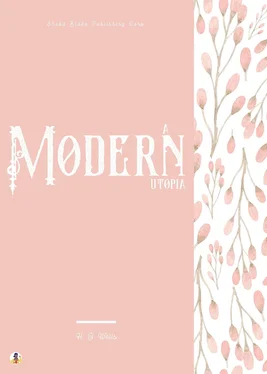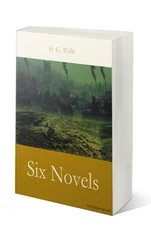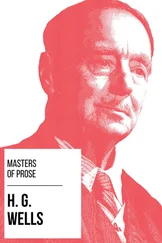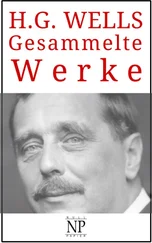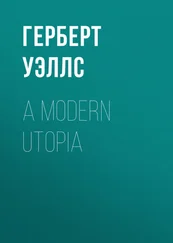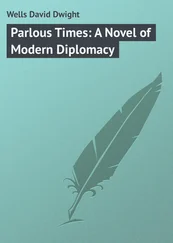“It is a trouble,” he says, “that has come into my life only for a month or so—at least acutely again. I thought it was all over. There was someone——”
It is an amazing story to hear upon a mountain crest in Utopia, this Hampstead affair, this story of a Frognal heart. “Frognal,” he says, is the place where they met, and it summons to my memory the word on a board at the corner of a flint-dressed new road, an estate development road, with a vista of villas up a hill. He had known her before he got his professorship, and neither her “people” nor his—he speaks that detestable middle-class dialect in which aunts and things with money and the right of intervention are called “people”!—approved of the affair. “She was, I think, rather easily swayed,” he says. “But that’s not fair to her, perhaps. She thought too much of others. If they seemed distressed, or if they seemed to think a course right——” …
Have I come to Utopia to hear this sort of thing?
* * *
It is necessary to turn the botanist’s thoughts into a worthier channel. It is necessary to override these modest regrets, this intrusive, petty love story. Does he realise this is indeed Utopia? Turn your mind, I insist, to this Utopia of mine, and leave these earthly troubles to their proper planet. Do you realise just where the propositions necessary to a modern Utopia are taking us? Everyone on earth will have to be here;—themselves, but with a difference. Somewhere here in this world is, for example, Mr. Chamberlain, and the King is here (no doubt incognito), and all the Royal Academy, and Sandow, and Mr. Arnold White.
But these famous names do not appeal to him.
My mind goes from this prominent and typical personage to that, and for a time I forget my companion. I am distracted by the curious side issues this general proposition trails after it. There will be so-and-so, and so-and-so. The name and figure of Mr. Roosevelt jerks into focus, and obliterates an attempt to acclimatise the Emperor of the Germans. What, for instance, will Utopia do with Mr. Roosevelt? There drifts across my inner vision the image of a strenuous struggle with Utopian constables, the voice that has thrilled terrestrial millions in eloquent protest. The writ of arrest, drifting loose in the conflict, comes to my feet; I impale the scrap of paper, and read—but can it be?—“attempted disorganisation? … incitements to disarrange? … the balance of population?”
The trend of my logic for once has led us into a facetious alley. One might indeed keep in this key, and write an agreeable little Utopia, that like the holy families of the mediaeval artists (or Michael Angelo’s Last Judgement) should compliment one’s friends in various degrees. Or one might embark upon a speculative treatment of the entire Almanach de Gotha, something on the lines of Epistemon’s vision of the damned great, when
“Xerxes was a crier of mustard. Romulus was a salter and a patcher of patterns….”
That incomparable catalogue! That incomparable catalogue! Inspired by the Muse of Parody, we might go on to the pages of “Who’s Who,” and even, with an eye to the obdurate republic, to “Who’s Who in America,” and make the most delightful and extensive arrangements. Now where shall we put this most excellent man? And this? …
But, indeed, it is doubtful if we shall meet any of these doubles during our Utopian journey, or know them when we meet them. I doubt if anyone will be making the best of both these worlds. The great men in this still unexplored Utopia may be but village Hampdens in our own, and earthly goatherds and obscure illiterates sit here in the seats of the mighty.
That again opens agreeable vistas left of us and right.
But my botanist obtrudes his personality again. His thoughts have travelled by a different route.
“I know,” he says, “that she will be happier here, and that they will value her better than she has been valued upon earth.”
His interruption serves to turn me back from my momentary contemplation of those popular effigies inflated by old newspapers and windy report, the earthly great. He sets me thinking of more personal and intimate applications, of the human beings one knows with a certain approximation to real knowledge, of the actual common substance of life. He turns me to the thought of rivalries and tendernesses, of differences and disappointments. I am suddenly brought painfully against the things that might have been. What if instead of that Utopia of vacant ovals we meet relinquished loves here, and opportunities lost and faces as they might have looked to us?
I turn to my botanist almost reprovingly. “You know, she won’t be quite the same lady here that you knew in Frognal,” I say, and wrest myself from a subject that is no longer agreeable by rising to my feet.
“And besides,” I say, standing above him, “the chances against our meeting her are a million to one…. And we loiter! This is not the business we have come upon, but a mere incidental kink in our larger plan. The fact remains, these people we have come to see are people with like infirmities to our own—and only the conditions are changed. Let us pursue the tenour of our inquiry.”
With that I lead the way round the edge of the Lake of Lucendro towards our Utopian world.
(You figure him doing it.)
Down the mountain we shall go and down the passes, and as the valleys open the world will open, Utopia, where men and women are happy and laws are wise, and where all that is tangled and confused in human affairs has been unravelled and made right.
Three
Concerning Freedoms

Now what sort of question would first occur to two men descending upon the planet of a Modern Utopia? Probably grave solicitude about their personal freedom. Towards the Stranger, as I have already remarked, the Utopias of the past displayed their least amiable aspect. Would this new sort of Utopian State, spread to the dimensions of a world, be any less forbidding?
We should take comfort in the thought that universal Toleration is certainly a modern idea, and it is upon modern ideas that this World State rests. But even suppose we are tolerated and admitted to this unavoidable citizenship, there will still remain a wide range of possibility…. I think we should try to work the problem out from an inquiry into first principles, and that we should follow the trend of our time and kind by taking up the question as one of “Man versus the State,” and discussing the compromise of Liberty.
The idea of individual liberty is one that has grown in importance and grows with every development of modern thought. To the classical Utopists freedom was relatively trivial. Clearly they considered virtue and happiness as entirely separable from liberty, and as being altogether more important things. But the modern view, with its deepening insistence upon individuality and upon the significance of its uniqueness, steadily intensifies the value of freedom, until at last we begin to see liberty as the very substance of life, that indeed it is life, and that only the dead things, the choiceless things, live in absolute obedience to law. To have free play for one’s individuality is, in the modern view, the subjective triumph of existence, as survival in creative work and offspring is its objective triumph. But for all men, since man is a social creature, the play of will must fall short of absolute freedom. Perfect human liberty is possible only to a despot who is absolutely and universally obeyed. Then to will would be to command and achieve, and within the limits of natural law we could at any moment do exactly as it pleased us to do. All other liberty is a compromise between our own freedom of will and the wills of those with whom we come in contact. In an organised state each one of us has a more or less elaborate code of what he may do to others and to himself, and what others may do to him. He limits others by his rights, and is limited by the rights of others, and by considerations affecting the welfare of the community as a whole.
Читать дальше
